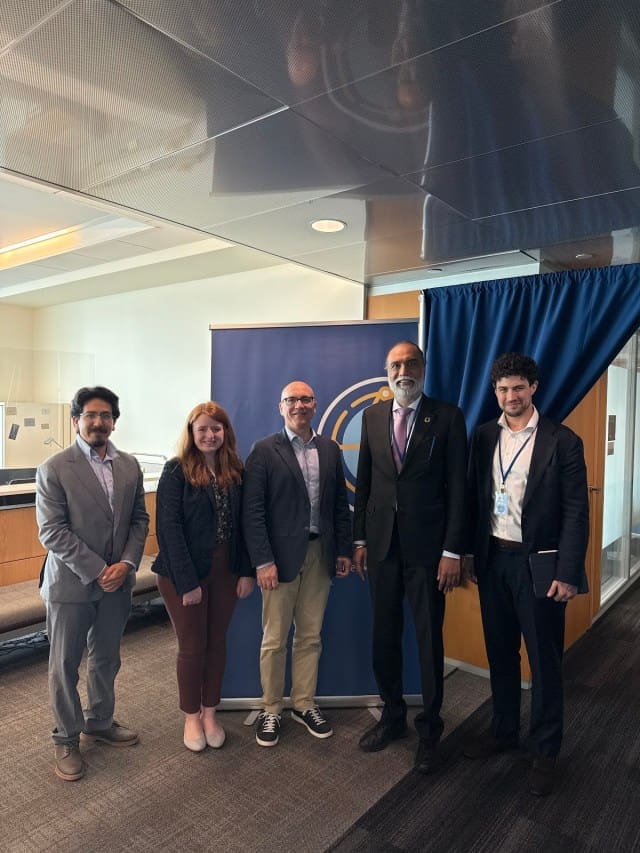Favorite On July 23rd, the Trump Administration released an “AI Action Plan” with a stated goal of “winning the AI race.” It will serve as a blueprint for policy actions the administration will take to accelerate AI in the United States. While the plan covers a lot of topics unrelated
Read More
 Shared by voicesofopensource August 12, 2025
Shared by voicesofopensource August 12, 2025

Favorite The UN’s Open Source Week in New York City brought people together from around the world to discuss the promise of Open Source and how it can be leveraged to build sustainable digital public goods and infrastructure. Stefano Maffulli, Executive Director of the OSI, was joined by board directors
Read More
 Shared by voicesofopensource July 8, 2025
Shared by voicesofopensource July 8, 2025
Favorite Just over 20 years ago, the EU (European Union) founded ENISA, (the EU agency for Cybersecurity). Over the years, ENISA’s role has grown significantly, and at this time the EU seeks to revise ENISA’s mandate by updating the Cybersecurity Act. The Open Source Initiative (OSI) has provided feedback on
Read More
 Shared by voicesofopensource July 3, 2025
Shared by voicesofopensource July 3, 2025
Favorite As the European Union (EU) prepares its budget for the coming years, the Open Source Initiative (OSI) has endorsed a proposal by Open Source think tank “Open Forum Europe” to create an EU Sovereign Tech Fund. The fund, modeled on the German Sovereign Tech fund, would support maintenance and
Read More
 Shared by voicesofopensource June 10, 2025
Shared by voicesofopensource June 10, 2025
Favorite The Open Forum for AI (OFAI), of which Open Source Initiative (OSI) is a member, submitted feedback to the White House in response to its request for information on the development of a 2025 National AI R&D Strategic Plan. An AI R&D Strategic Plan was first issued in 2016
Read More
 Shared by voicesofopensource June 3, 2025
Shared by voicesofopensource June 3, 2025

Favorite Be part of a global conversation on the future of openness at the OpenForum Academy (OFA) Symposium 2025, taking place November 18–19 at the FGV Law School in Rio de Janeiro, Brazil. Through expert panels, case studies, and collaborative discussions, the Symposium will consider the transformative potential of openness
Read More
 Shared by voicesofopensource April 16, 2025
Shared by voicesofopensource April 16, 2025
Favorite In 2024, the European Union approved the Artificial Intelligence Act, the world’s first legal framework for AI. Part of the law mandated the creation of a Code of Practice for General Purpose AI for AI developers. The OSI applied to take part in the drafting of these rules, but
Read More
 Shared by voicesofopensource March 27, 2025
Shared by voicesofopensource March 27, 2025
Favorite The Open Source Initiative (OSI) submitted public comments with the Apereo Foundation in response to the White House Office of Science & Technology Policy’s (OSTP) request for information (RFI) on an AI Action Plan. The development of an AI Action Plan was directed by President Trump’s Executive Order, “Removing
Read More
 Shared by voicesofopensource March 19, 2025
Shared by voicesofopensource March 19, 2025
Favorite Every year, public authorities in the European Union spend around 14% of annual GDP on services, works and goods. As European governments continue to digitalize, a growing share of this spending is on digital solutions. Sadly, few of these solutions are built on Open Source software, but that might
Read More
 Shared by voicesofopensource March 12, 2025
Shared by voicesofopensource March 12, 2025
Favorite As 2024 draws to a close, the Open Source Initiative (OSI) reflects on an eventful year marked by significant achievements in advocating for Open Source principles in policy and standards development worldwide. Below, we highlight key milestones, initiatives and ongoing work from the year. Global engagements Columbia Convening on
Read More
 Shared by voicesofopensource December 19, 2024
Shared by voicesofopensource December 19, 2024
Shared by voicesofopensource August 12, 2025


